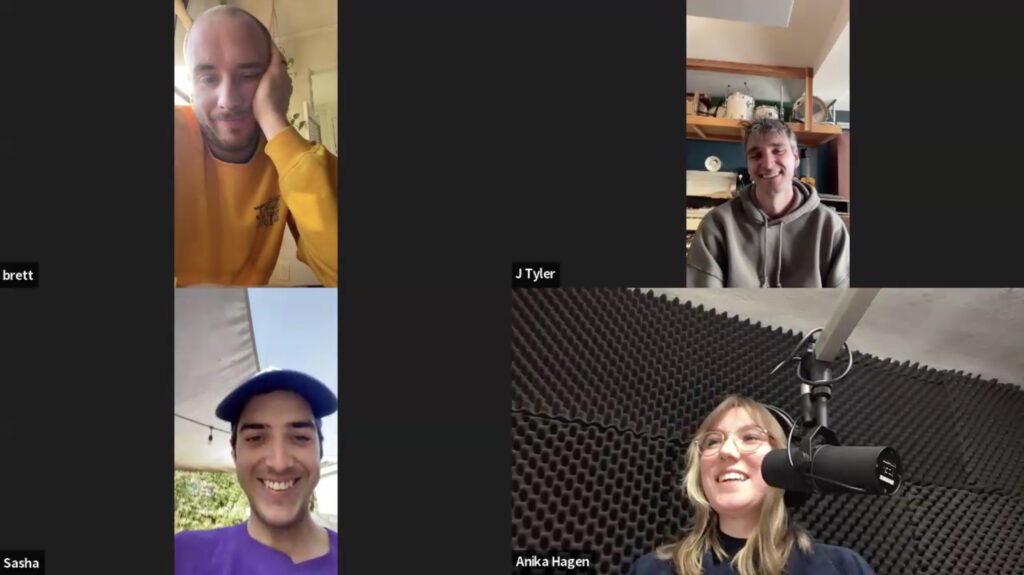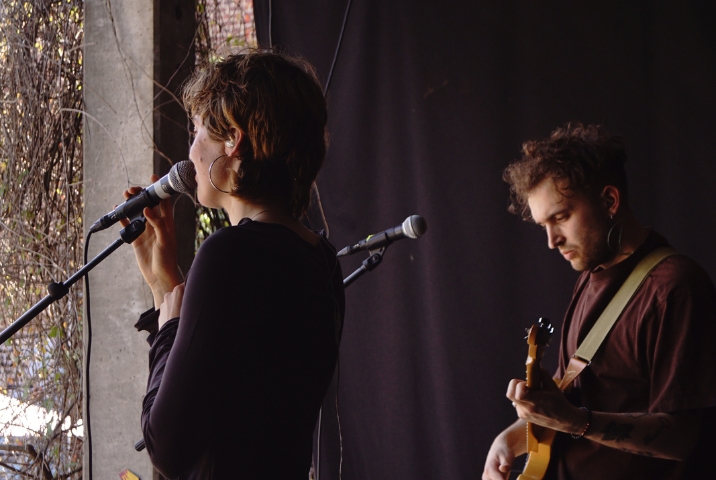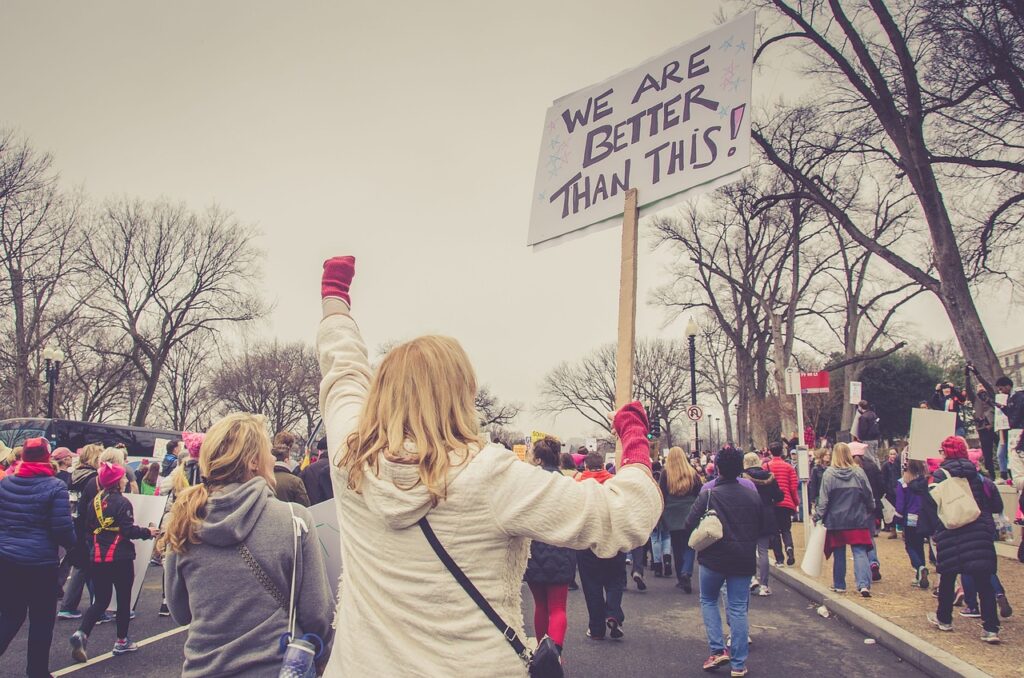“It’s like to wear a skin that’s different than your own” – half•alive im Interview zum neuen Album “Persona”
Written by Anika Hagen on 19. November 2024
Die US-amerikanische Band half•alive ist nach zwei Jahren mit ihrem 3. Album “Persona” zurück. Die Songs bewegen sich zwischen Indie-Pop und Alternative – die Genres, in denen half•alive ganz Zuhause sind. Besonders geschätzt von den Hörer*innen werden die persönlichen Lyrics der Band, die auch bei “Persona” Themen behandeln, die jeden berühren können. Warum das Album die Nostalgie der Vergangenheit einfängt, was die Monster Sonny und Cher verkörpern und wie der Entstehungsprozess der 3. Platte war, haben mir die drei Bandmitglieder Sasha (Sänger), J Tyler (Bassist) und Brett (Drummer) im Interview wenige Tage vor dem Albumrelease erzählt.
Anika: Hi, I’m here today with the band half⋅alive. It’s very nice to meet you guys. First of all, congrats on your new album, Persona. It’s coming out in a few days already. You must be very excited for the upcoming release right now. How are you feeling in general?

Brett: I think we’re really excited. I’m really proud of this album. I feel like it’s the best one yet, and we can’t wait for everybody to hear it. We’re slowly getting into tour mode, and so that’s been exciting as well.
Anika: Yeah, I can imagine. I mean, it’s been some time since your last record. Would you say the process of producing this album was a bit different? Was there anything that was especially challenging or surprisingly easy that didn’t work as well before with other records?
J Tyler: Yeah, I think this record, we really had a clear vision, I think, after some time away from… We were on tour and then started working on new songs and then went back on tour. There was a lot of space to think how we wanted to approach this record. I think we found that we wanted to boil it down to just the core elements, and that was us as a band, what do we bring individually and lean into that. We found a producer in that way that allowed us to be a band in a space, playing our instruments, and let that be what the songs are. Simply a great drum part, a great guitar part, a great bass part, a great vocal melody, great keyboard parts, and let there be all the fluff or all the other things put to the side and just let that be our core elements for our song. I think in a way, it was different the other albums because we had such a clear thing once we got in the studio with Tommy King, our producer. In the past, sometimes it’s all over the place. But this record, we really had a through line the whole time. Sticking to, just boiling it down, really helped us figure out what made sense and why we chose the songs we chose and thinking about how we’re going to play them live and bring them to the live show. It all felt like in tandem, which has not always been the case for us. That was an inspired space. The limitations I found really led to great results for us on this record.
Anika: It sounds like a very long process, and I can imagine how exciting it can be to actually finish this and let it out into the world now that it’s done.
J Tyler: Yeah, very much so. I think it was cool as well, the space that we created, it was a new start, in the studio that we’re at, we had two rooms, and in the songwriting process, again, a really great opportunity for us to be in one room focusing on music and in the other room at times, Josh would be with another writer and working on Lyric and top melody. Then halfway in the day, we’d all come together and be like, “What’s the space? What does the music look like?” I think there’s just a beautiful collaboration in a way that was really unique for this record that we hadn’t done in the past as well. There felt like a lot of fresh things for us. It was cool to see that type of element, to see how we could make songs in that way and how we could bring in the right types of collaborators that we’ve loved on the past records to help make this record with us, too. There was a lot of just beautiful moments I found that felt fresh for us, but also trial and error from previous records.

Anika: I saw that you introduced the two characters, Sonny and Cher, with the new album, the two puppets. Could you explain the whole idea behind them? Are they connected to the album title, “Persona”, even? Or who came up with the main concept of them?
Sasha: Yeah. From the title “Persona”, it’s like to wear a skin that’s different than your own. And so the most obvious representation of that is a mask. Coming up with these two characters allows a sense of, like, with them relating with other humans, with them relating with each other, there’s ways to tell the story of relationship. A lot of this album is about looking at the stranger and seeing yourself in it. The Monsters are a great representation of how to use that. Then their story plays out within the music videos, and they’re meeting in one music video, but seeing each other in a different one, and then continuing from there.
Anika: I saw that Sonny and Cher were in your music videos as well. Sometimes they were just hidden in the background somewhere or sometimes very present. Your music videos in general and your presence on YouTube played a very huge role in your career in the past. How do you feel about YouTube’s role today with your new record? Or have you shifted your focus other platforms like TikTok?
Sasha: I think everything has to be focused on at the same time in a way. But we’re definitely not putting all of our eggs in the basket of short form media, but more as a way to get people to show, ultimately, or to something where they can sit down and be focused. But sometimes to do that, you have to lily pad from a phone to a computer to the live show or to listening to the record on vinyl or with headphones or something more intentional like that, because that’s where we can really experience the art and get swept up in it and be intoxicated in the music. But it’s much harder to do that if you’re just scrolling. Hopefully, it transfers and people are interested enough in seeing five seconds of something to then watch more of something else and finally make it into the fold.
Anika: Yeah, I mean, the Internet is so fast-paced. I can tell that it must be really hard to actually get people to watch your content. I guess it’s easy to get some attention through TikToks because they’re very short. Then maybe they’ll get to your YouTube where they can spend a bit more time on watching something.
Sasha: Yeah, especially because a lot of the things that have views are like, comedy. It’s just like sketches and silly things that people are like, “Oh, this is funny. I’m going to send it to my friend”. But something that’s trying to change the world in some ways is not as marketable, it turns out. We have to be creative on that. But also knowing that there’s TikTok and Instagram and Twitter, and all these things are around right now. But in 10 years, who knows what it’s going to be. But the music will stay. And so focusing our time, first and foremost, on the music itself and making sure that we’re really proud of that, that’s going to be the timeless piece of media here.
Anika: Yeah, that makes sense. You’ve already released three new music videos already for your new record. Do you have more videos in the works or is it going to be these three for the album?
Sasha: There’s one more in the works right now. But yeah, those three are the main flag pulls. Those are the three that I directed of these bunch, and then the next one, one of our choreographers directed. But it’s on its way soon, and it’s pretty wild.
Anika: Sounds very exciting! How long does it usually take to bring each music video concept to life, especially with all the choreography and stuff you have? Would you say that you need a lot of takes, or is it sometimes super fast until you have all the takes you want?
Sasha: It’s very different depending on what the concept is. On the first ones, we did… I mean, on “Sophie’s House”, it was like a full MGM style musical. That’s what we were going for. So like, rooftops, having West Side story-esque choreography. That took weeks of time and preparation. And similar thing with “Automatic” being in the auto shop. But with “Songs”, it took six hours. The last video we just released, it was a one-er. We only had six hours. We only have enough money to rent the space for this amount of time and this amount of people. Just getting in the space and figuring it out really fast. So it’s wide range.
Anika: Six hours sounds very short. I watched it and it definitely doesn’t feel like something that you only took six hours for. But great job there, definitely.
Sasha: Thank you.
Anika: Moving away from the music videos a bit. One of your pre-singles is the song “Sophie’s House”. On Instagram, you explained that “the song doesn’t just basc in nostalgia. It begs the question, Can you turn the nostalgia of the past into a wonder for the present?” How would you guys answer that question for yourselves, personally? How would you interpret the song for yourselves?
Sasha: Definitely for me, I was thinking about this time of high school, of having a lot of freedom of time and a little bit of money and being free of much responsibility and how it could feel like time off of school, like summer would be… It feels so different then and now. How summer now is just hotter. It’s just the temperature is hotter, but we’re all still at work. It’s this moment of returning to the past and wondering, “Oh, man, why does it feel so different now being older?” I never even thought about time back then. There was no thinking about… Time did not exist, and now time very much exists. It’s like, there’s only so much of it. It’s a finite resource. How do we use it to the best for our abilities? The idea in the song for me is that, how can I use that time, not spent looking in the past, but instead, realize the gift of the present and use that time well, I suppose.
J Tyler: Yeah. I think we were as well with that story being told and those lyrics. I would say a lot of a core feeling for this record is nostalgia in a way. We’re looking for things that feel like classic, things that can survive the test of time, both in storytelling and in our approach in most things as well in the music side of things. We were looking for sounds that felt both nostalgic, something that we may be familiar with, and how can we flip it on its head a little bit. I think that’s a lot of what the half⋅alive record for “Persona” is in a lot of ways. “Sophie’s House”, particularly as well. Sints that are maybe vintage and very popular from a certain time, but how do we make them feel fresh for today? How do we tell this story of nostalgic feelings of the past, of high school, of these better times in the past, but bring it present today? How do we put a little bit of a spin on that? I feel like each song on this record is trying to hold both of those things, something familiar with something new and something unfamiliar, and sing how we can marry that together in song, both musically as well as lyrically. I think that’s a cool element that I think in theory, makes sense and took a while, practically, to get there. But once we found it in the studio, I think we’re very excited that the storytelling and the sonics can carry the tension of how do things feel nostalgic, but also old present time and experience.
Anika: That makes sense. Nostalgia can feel like a weight sometimes, I think, especially if you think about your past, your time at school. But from what you can hear in “Sophie’s House”, for example, it feels very light-hearted and something that is more like a familiarity you actually want to remember.
J Tyler: For sure. Yeah.
I think part of the job of the artist is to put words to the people that cannot put words themselves to it. […] Trying to put yourself in the stranger’s shoes and understand that you have very similar hopes and dreams and fears, even though you’re a chasm apart.
Anika: Your songs allow listeners to connect with the lyrics, personally, from each record that you’ve released so far. Would you say that your writing style for “Persona” kept this relatable quality, or have you maybe tried new writing styles or something like new perspectives?
Brett: For “Persona”, this album had, I think, the gift of having two albums behind us. This album kept consistency of taking risks and trying new things like we always do each album, but we had the gift of having two albums behind us so we could see what had worked in the past and lean into things that we felt were strengths of ours. We were able to, on this album, still take risks but also hone in on what we thought the best parts of our past two albums were.
Sasha: Yeah, it definitely still trying to keep a relatable quality. I think part of the job of the artist is to put words to the people that cannot put words themselves to it. Certain emotions that just feel you can only scratch at, but you can’t ever place what it is. That’s in a lot of ways what we’re hoping to do on this record, especially. There’s a song on the record that’s about the moment of being on the highway next to someone and looking over and realizing they have their own life that they’re going to, that their own dreams and everyone. Then there’s thousands and millions of the same scenario happening in the same moment. Trying to put yourself in the stranger’s shoes and understand that you have very similar hopes and dreams and fears, even though you’re a chasm apart. Definitely, the relatable aspect is hopefully still there for people on this record.
Anika: Just the idea of someone you don’t even know being able to connect to your lyrics is a very beautiful thought, that someone out there you’ve never met can see some comfort in listening to your lyrics and relate to that song.
Sasha: I hope that it can develop a sense of empathy because I think, especially right now, it seems like there’s such a lack of empathy. We just had an election in our country, and that’s what I’m seeing around. It’s just a lack of understanding and empathy for your neighbor. I’m hoping that in some ways, the themes of these albums can come through and develop a sense of compassion and empathy for someone who you are on the opposite side of or you’re very near to and you just don’t know.
Anika: I’m very sure that you can achieve that in some way with your fans. I have another question; about your tour plans. Do you have any upcoming tour “Persona”? If so, are there any chances of a European tour? I know you’ve been here before. The closest city to Münster, where I am right now, is Cologne. Are there any plans on that you would like to share?
Brett: We love Cologne, love touring Europe. We have not announced our tour yet, but I imagine we will probably see you guys soon.
Anika: We’re excited about that. Now, onto my last question. Do you guys have any music discoveries you recently made that you would like to give to our audience?
Sasha: The new album by Leif Vollebekk has been hitting me hard recently. Very good. I would recommend that to anybody.
J Tyler: Andrew Aged played on our record, and he’s one of the guitar players that plays with MK.gee a lot. So shoutout MK.gee in that world, and Andrew is an incredible guitar player as well. So we’re thankful to have him on our record, but that’s a great artist to check out if you haven’t heard of him.
Brett: For me, the album by Katie Gavin is the best album I’ve heard this year, maybe, I don’t know, in a long time.
Anika: Thank you for the interview and for answering the questions so well. Hopefully see you soon in Cologne!
Sasha: Yeah, of course. Thanks, Anika.
Brett: Thanks for your time.
J Tyler: We will see you there for sure!






